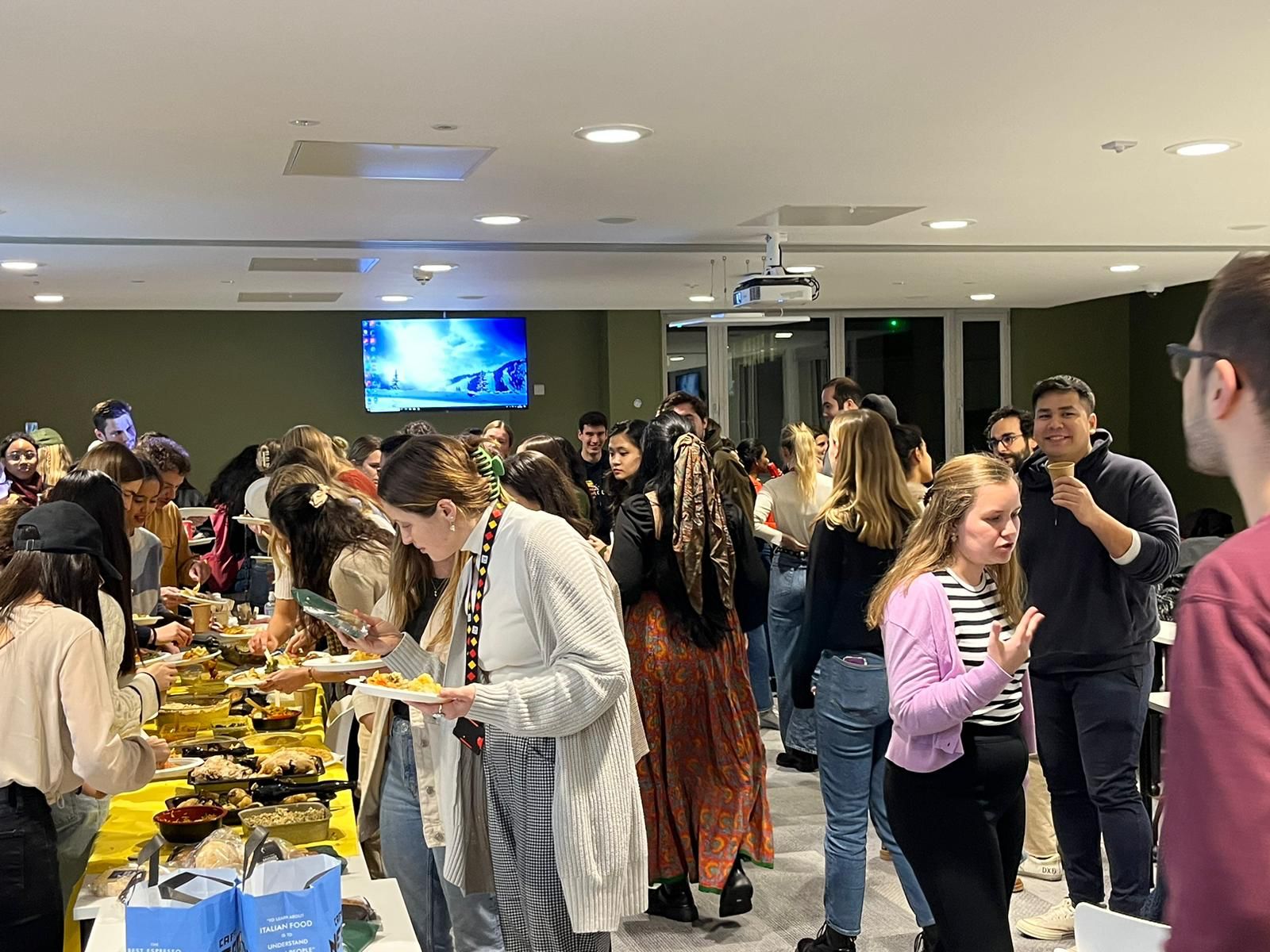Student Ambassadors, Gya and Hari, talk about their first week at LSE and share tips with incoming students on settling in to the academic year and being Covid prepared.
Transcript:
“Hi everyone and welcome to this podcast! I am Gya and with me is Hari. We are Student Ambassadors for the Department of International Development and we would like to talk about our first week coming to LSE, last year. Hari is an MSc in Health and International Development student from India, and I am an MSc in Development Studies student from Indonesia.”
What did you do this time last year?
Hari: I arrived around one week before the programme started, I moved into halls, and went around buying stuff. I aslo attended some events at LSE.
Gya: I arrived two weeks before Week 0. I stayed at a friend’s place, then moved to student halls. Settling down was quite hectic.
How was your week before arriving at LSE?
Gya: Packing was surely a big headache. I checked blogs from past students, which were helpful! Especially those coming from my region, in this case, Asia.
Also, I we needed to make sure we packed important documents, including BRP [British Resident Permit] collection ticket, because the visa expires within a month and we’ll live with BRP afterwards. It is important to check the time and place to collect it and collect it immediately upon arrival. But remember not to carry BRP all the time, because if you lose it, you’ll be in a big trouble. I only used my driving license [from my home country] as an identification card, it has my name and it is in English. So it’s better to use another form of ID instead of carrying your BRP all the time.
I also packed warm clothes. Not too many, because I knew I could buy clothes here, or order them online. London has more and better options.
Many other things are surprisingly can be found in London. In my case, Asian Stores have almost everything.
But if you have some comfort stuff, I would say pack it, just in case they don’t have it here.
Last year I forgot to pack my comfort stuff [Gya showing a bottle of Indonesian ointment], they don’t sell it here. It’s an Indonesian thing to have when you catch a cold.
Hari: I don’t think I forgot to pack anything!
How did you set up a bank account?
Hari: Setting up a UK bank account can be tricky, especially for international students. As a student, you have a variety of options, but you may be able to start an account only after becoming a UK resident. You will need proof of identity as well as proof of address. If you are staying in a hall, LSE can provide a letter with your address. You can request this via the Student Services Centre. Make sure you request this letter after you update your address on LSE For You. See this link for more information.
Once you have this letter, you may need to set up an appointment with the bank. Some banks also offer processes in which you can set up an account completely online without the need to visit a bank branch.
Most banks take a bit of time. You may be able to set up an account and get an account number quite fast. But to get a debit card, it may take longer – up to a month. Also, some bank accounts have student-specific offers, like free railcard or food discount cards which you might want to check out.
Are there discounts available for students?
Gya: People said living in London is very expensive, but we had student discounts. There were two important discounts for me.
Firstly, the 18+ Student Oyster card for transport. You can check this link from Transport for London (TFL) to register. They will verify with LSE that you are a student. Then you will get a 30% discount. TFL has packages on bus and tube, you will get the discount for them. Also, if you have a railcard, you can connect the oyster card with a railcard to get 30% off when you do pay-as-you-go travel. It is very important to get this oyster card.
Secondly, an app called UNiDAYS. It compiles student discounts for many brands, from clothing, food, sport, services, etc. You can just look at the app and get the discount from there, very easy.
Last thing, Apple and Microsoft also offer discounts both online and in-store once you get your LSE ID. Also, Amazon Prime and Netflix offer student discounts. The kind of entertainment you might need these days when theatres and plays are still closed.
What I usually do, if a store does not advertise accepting student discounts, just ask before paying at the cashier. Usually, they have some 10% discount or a bonus card, etc. Just ask, in the worst case they will say no.
What about the NHS? Do you need to register? How does it work?
Hari: The UK has the National Health Service or NHS, which is the public healthcare system. There are a few private healthcare facilities. But they are fewer in number and quite expensive. As students, we have the right to healthcare in the UK. There is a process to register with the NHS, which is primarily about registering with a GP or General Practitioner. GPs are the local clinics, also called surgeries. They are small clinics for primary care and act as the first point of care. Most GPs require you to go in person and register. But now most GPs offer online registration as well. See this link for more information.
GPs will be your first point of contact with the NHS. You can call them and set up an appointment with doctors. Typically it takes a few days before you get an appointment, but there is a process to get a same-day appointment as well. If you have any chronic conditions, you may be eligible for a medical exemption card, which will exempt you from paying for medicines.
If you have an emergency, you need to call 999 or can go directly to an emergency department. Emergency departments are great for emergencies, but if its something that is not an emergency, it might mean waiting for a long time. Then you have two options: one, call 111, the NHS helpline, who can help you over the phone, or two, go to a pharmacy, where you can walk up to a pharmacist and they will be able to advise and give medications as well. However, if you think you have coronavirus symptoms you should not go to places like a GP surgery, hospital or pharmacy.
What are the changes in living in London because of Covid-19?
Gya: We have been living with this pandemic here while studying for the past six months. I think it is important to carry face masks because you are going to need them on public transport, supermarkets, and even in small stores and museums – basically any closed space. It is necessary to carry face masks, just in case you need to entre a closed space.
Remember to maintain social distancing, stay two metres apart from people who are not from your household whenever possible.
If you arrived from abroad, check the government’s advice for self-quarantine (if applicable). Like, how long you should do it and how to do it.
Check the rules within your place of residence, whether you are staying in a friend’s house, student halls, private accommodations, hotels, hostels, because they usually have regulations to get in and out of the buildings and sanitising. They try not to overcrowd the building. So before coming, please check the expected ‘COVID-19 secure behaviours’ in your accommodation.
In the worst-case scenario, if you develop coronavirus symptoms how should you manage?
Hari: The NHS asks you to look out for three symptoms.
- High temperature or fever.
- New, continuous cough.
- Loss or change to your sense of smell or taste.
If you have one of them, then you need to do two things.
- Get yourself tested
- Self-isolate
NHS offers a variety of testing options including home testing. Also, you and people you are living with need to self-isolate. I think the latest rule is that you need to self-isolate for 10 days. If you are living in shared accommodation, this means everyone in the shared accommodation will need to self-isolate.
If you are worried about your symptoms or if you are unsure what to do, then you can use the NHS 111 online coronavirus service. If you cannot get help online, then you can call 111 for advice. You should not go to places like a GP surgery, hospital or pharmacy.
Arrangements are made to get you food and essential items when you self isolate in a hall. If you are staying outside, there are local volunteers or you can call the NHS who can get you in touch with a Good Samaritan volunteer. It is also good to identify people you can mutually help when one of you are self-isolating.
Where did you get essential items, now and then?
Gya: I went to Primark a lot and a big Tescos. The big Tescos has kitchen equipment, unlike the smaller ones. This works if you do not want to go to specific stores [for home appliances] like Argos.
Hari: These days many stores have opened up. Primark is a good option, but if you want better quality, there are other options like John Lewis, etc. There are lots of stores that deliver stuff to your house, like IKEA, Amazon and Argos. Even mattresses can be delivered to your house.
Book stores and stationery stores have also been opened and some available for online orders.
We wish you the best of luck for your study preparation!






The views expressed in this post are those of the author and in no way reflect those of the International Development LSE blog or the London School of Economics and Political Science.